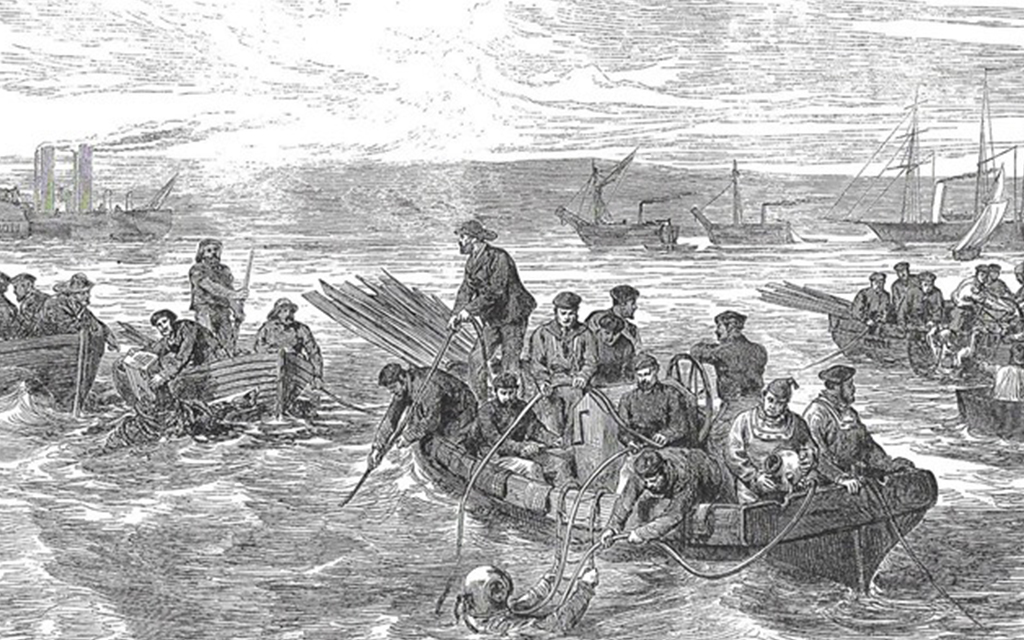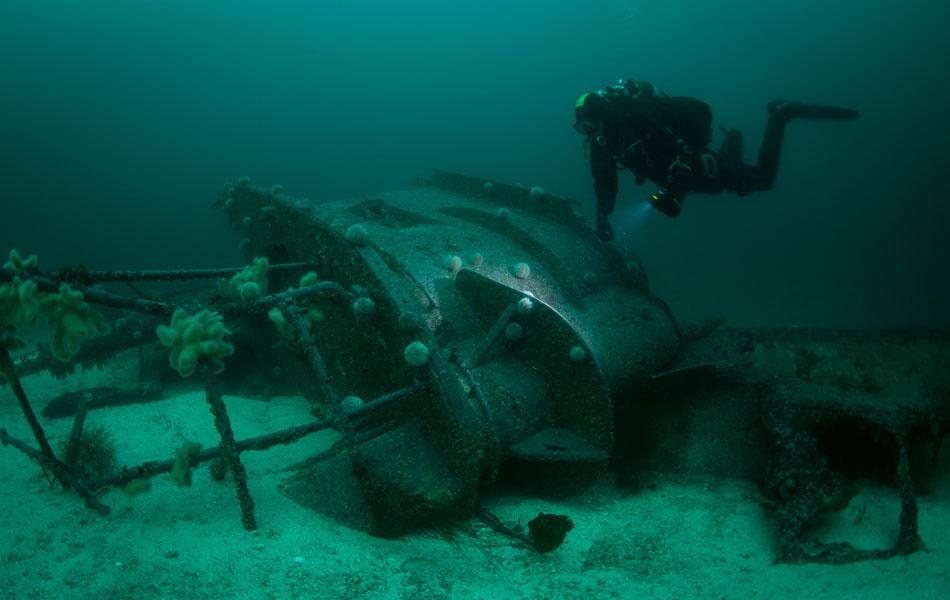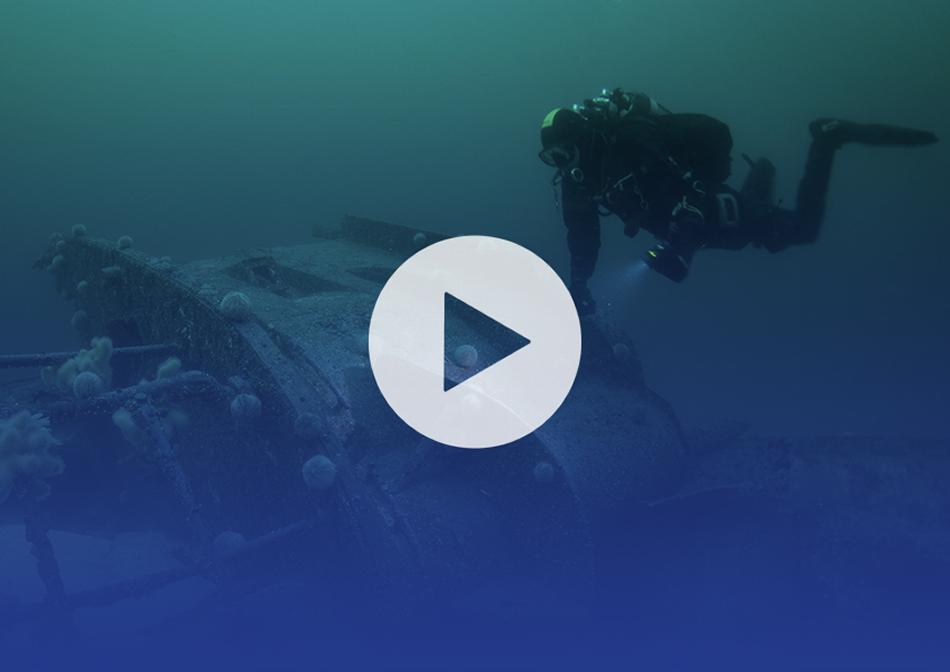
BSAC has collaborated with the Historical Diving Society to bring members and divers an exciting series of webinars covering some of the best underwater stories and adventures.
Starting on the 4 March at 19:30 and then every Thursday night until the 29 April, the weekly webinar event will feature a total of nine online presentations, each one exploring a fascinating diving tale of exploration and adventure.
Starting with the salvage of gold from HMS Edinburgh, 246m down, each webinar aims to bring the recent and not so recent past of scuba diving to life and will appeal to anyone with a love of underwater adventure.
The partnership with the Historical Diving Society (HDS) meant divers and non-divers could delve deep into scuba diving’s fascinating past.
The HDS has a passion for exploring, preserving and recording our diving heritage, which fits so well with BSAC. Anyone with an interest in our diving heritage will enjoy the opportunity to engage with the webinar topics, with many being presented by speakers who were there.
One highlight of the series will be the story of the disappearance of Commander ‘Buster’ Crabb and will be presented on 22 April by Anne Bevan, based on her late husband John Bevan’s book. John was a BSAC National Instructor as well as the founding Chair of the Historical Diving Society.
HDS is a charity, and so there will be a small charge for each webinar as a donation. Webinars are priced at £3 for members and £5 for non-members, and places can be pre-booked online. Each webinar needs to be booked individually so you can choose which one you want to attend.
The Historical Diving Society exists to promote and preserve our diving heritage. Being able to bring these webinars to our membership, and wider, means we can continue to support their essential work.
You can book your place on the HDS webinars at bsac.com/webinars (non-members can book by emailing drt@bsac.com).
Please note: the webinars are live events and will not be recorded so each one must be watched on their broadcast date.
The full programme includes: |
|||
| Thu 4 Mar 19:30 - 20:30 |
Salvaging the gold from HMS Edinburgh Mike was the Diving Superintendent responsible for the diving operations and his talk will address the naval engagement and subsequent salvage. |
Mike O'Meara, HDS Chairman |
|
| Thu 11 Mar 19:30 - 20:30 |
Virtual tour of 19th-century submarine engineers' factory Charles Edwin Heinke and his brother John William founded their submarine engineering c1820’s. The company amalgamated with the India rubber manufacturers, Williams & Foster, in 1904. Heinke moved to the Bermondsey factory. This lecture is possible because of a collection of photographs recording the working environment of a submarine engineering factory in 1905. |
Gary Wallace-Potter, HDS founding member |
Member booking: £3Non-member booking: £5 |
| Thu 18 Mar 19:30 - 20:30 |
Historic diving in Ireland |
Edward Bourke, HDS member |
|
| Thu 25 Mar 19:30 - 20:30 |
Submarine diver lock-out operations in the Argyle Field 1976-1978 For a brief but exciting period, diving companies introduced the use of diver lock-out submarines. These brought with them their own challenges and a range of potential single-point failures, including limited power, poor diver heating and limited gas supplies. For sound safety and practical reasons, submarine lock-out operations were abandoned and replaced by purpose-built support vessels equipped with integral saturation diving systems, dynamic positioning, and many layers of redundancy. For two years, Mike was the Diving Superintendent employed by Strongwork aboard the Star Pisces, responsible for the diver lock-out operations from a diver lock-out submarine working on the first field to produce oil in UK waters - the Argyle Field. |
Mike O'Meara, HDS Chairman |
|
| Thu 1 Apr 19:30 - 20:30 |
Underwater welding |
Dave Gibson, BSAC Dive Leader & welding engineer |
Member booking: £3Non-member booking: £5 |
| Thu 8 Apr 19:30 - 20:30 |
William Walker: the diver who saved Winchester Cathedral |
Gary Wallace-Potter, HDS founding member |
Member booking: £3Non-member booking: £5 |
| Thu 15 Apr 19:30 - 20:30 |
The salvage of the Dixilan Field 83 rig Fortunately for the crew, the vessel did not capsize completely at that time and the crew were all able to evacuate. Shortly afterwards, the starboard leg collapsed and the entire vessel sank to the seabed in 240ft of water. Mike was the Diving Superintendent responsible for running the diving operations throughout the 104-day demanding offshore salvage operation. The operation involved a 3,000-ton heavy lift crane barge, 1,000-ton A-frame lifting barge, three heavy-duty tugs, and many days spent underwater cutting, rigging and lifting, as well as penetrating the wreck and coordinating heavy crane lifting all before the monsoon season arrived. |
Mike O'Meara, HDS Chairman |
|
| Thu 22 Apr 19:30 - 20:30 |
The disappearance of Commander Crabb - what really happened? Daily Mail reporter Peter Marshall was first to expose the deception, followed by a host of others representing the press, radio and television. The cover-up inevitably led to a raft of speculation and a host of claims and theories about what happened to Crabb. When the classified information was due to be released, the ban was extended to cover 100 years from the time of the incident. Why? Without an official account of the covert operation and consequent events, speculation continues to fuel the mystery. This talk examines the facts and attempts to explain what really happened. |
Ann Beavan, Commander Crabb expert |
|
| Thu 29 Apr 19:30 - 20:30 |
The raising of the Kursk After some internal delays, the Russian authorities requested international assistance, however, the initial delays in reporting her loss combined with inadequate early intervention caused lost opportunities for successful lifesaving intervention. Mike will share his experience as part of the three-man team hastily mobilised at short notice to travel to St Petersburg to negotiate and plan with the Russian senior naval command, as well as the first stage of the salvage operation. |
Mike O'Meara, HDS Chairman |
|
Join the BSAC community
The BSAC network is working together to keep people connected to the sport. With online training, special interest webinars, competitions, support to clubs and the trade, and much more...we'd love you to join us.





